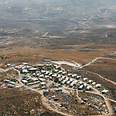
The report shocked many by determining that Israel is not an occupying power in the West Bank and recommended that most outposts and settlements be legalized. The recognition of the Ariel University Center as a full-fledged university added fuel to the fire.
These developments drew the predictable reactions from centrist and leftist Israelis who stressed that Israel is an occupying power in the West Bank and therefore the establishment of Israeli and communities and institutions there is forbidden.
But perhaps Justice Levy did get one thing right. Maybe the term "occupation" is no longer relevant to the Israeli regime in the West Bank. I claim that the occupation has transformed into colonization a long time ago – including expulsion, settlement and the continuous nationalization of the territory and its resources – and all this while preserving the local Palestinian population's inferior status.
Occupation is temporary and is military in nature. Israeli presence in south Lebanon was an example of occupation as it did not involve permanent civilian settlement or expulsion.
True, the Levy Report is riddled with falsifications, including the claim that the Balfour Declaration grants the Jews sovereignty over all of Palestine - as though international law has not evolved since 1917. In the spirit of colonialism, the Levy Report ignores the collective rights of 90% of the West Bank's population – the Palestinians - as if they did not exist.
The Levy Report openly expressed what has been obvious for a while: The Jewish areas in the West Bank, which cover about half the territory, have long since been governed in accordance with Israeli law, as though they are an integral part of Israel. It is important that the Israeli public be aware of this.
The continued colonization of the West Bank is far more dangerous to Israel than any other threat, including a nuclear Iran. This is not about an external military threat from the fanatical Ayatollah's regime; it is about a devastating internal threat that is dragging Israeli society towards an apartheid regime in the territories.
How did this happen? Since the 1970s the State has been applying Israeli law to the Jewish settlements. With a series of legislative tricks, Israel has created a separate legal system by which the Jewish settlers have full civil rights while the Palestinians have none. In the meantime, Israel has expropriated hundreds of thousands of dunams of private Palestinian land by distorting local and international law. Later, almost every Jewish outpost and institution was unofficially recognized by the state.
Meanwhile, the Palestinians, who according to international law are entitled to sovereignty in the West Bank, continue to suffer under a violent military regime. They are forbidden from expanding their communities, are restricted in their movement and are barred from entering Israel.
Over the years Israel has erased the Green Line for the Jews, but extended it for the Palestinians. Palestinian terror made matters worse, as it allowed Israel to expand the settlement enterprise under the pretext of security concerns.
Many will ask: How can a colonial regime exist in land that historically belongs to the ruling nation? No one is disputing the fact that the Jews are historically and religiously connected to Judea and Samaria, but this does not necessarily lead to sovereignty.
Imagine what would have happened had the Arab-Syrian nation taken over Israel and settled in it, claiming it is the successor of Arab regimes that ruled over the land in the past? Such a development would have been considered an illegal colonial move because of the Israelis' right to self-determination, despite past Arab sovereignty.
It is known that "real change begins by calling things by their proper names." Therefore, we should refer to the West Bank as a "colonized" rather than an "occupied" area - just as the British colonized Northern Ireland and the Serbs colonized Kosovo.
This is not semantics, but the beginning of political awareness. The challenge for the proponents of peace is to progress towards post-colonialist reconciliation, which demands that the State secure the rights of the Palestinian population.
Professor Oren Yiftachel teaches political geography at Ben-Gurion University in Beersheba















